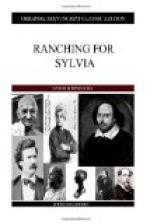It struck Edgar as a rather stern doctrine, but he admitted the truth of it; what was more, he felt that George and this farmer had many views in common. Grant, however, changed the subject.
“You had better take your two heavy teams in to the Butte on Monday; I’ve ordered my freight there until the sandy trails get loose again. Bring a couple of spare horses along. We’ll load you up and you can come in again.”
“Two Clover-leaf wagons will haul a large lot of seed in a double journey.”
“It’s quite likely you’ll have to make a third. Don’t you think you ought to get this hauling done before Lansing comes home?”
A light broke in on Edgar. Grant was, with some reason, occasionally called hard; but he was always just, and it was evident that he could be generous. He meant to make his gift complete before George could protest.
“Yes,” acquiesced Edgar; “it would be better, because George might want the teams, and for other reasons.”
The farmer nodded.
“That’s fixed. The agent has instructions to deliver.”
Edgar left the homestead an hour later and spent the Sunday resting, because he knew that he would need all of his energy during the next few days. At dawn on the following morning he and Grierson started for Sage Butte, and on their arrival loaded the wagons and put up their horses for the night. They set out again before sunrise and were glad of the spare team when they came to places where all the horses could scarcely haul one wagon through the soft black soil. There were other spots where the graded road sloped steeply to the hollow out of which it had been dug, and with the lower wheels sinking they had to hold up the side of the vehicle. Great clods clung to the wheels; the men, plodding at the horses’ heads, could scarcely pull their feet out of the mire, and they were thankful when they left the fences behind and could seek a slightly sounder surface on the grass.
Even here, progress was difficult. The stalks were tough and tangled and mixed with stiff, dwarf scrub, which grew in some spots almost to one’s waist. There were little rises, and hollows into which the wagons jolted violently, and here and there they must skirt a bluff or strike back into the cut-up trail which traversed it. Toward noon they reached a larger wood, where the trees crowded thick upon the track. When Edgar floundered into it, there appeared to be no bottom. Getting back to the grass, he surveyed the scene with strong disgust; he had not quite got over his English fastidiousness.
Leafless branches met above the trail, and little bays strewn with trampled brush which showed where somebody had tried to force a drier route, indented the ranks of slender trunks. Except for these, the strip of sloppy black gumbo led straight through the wood, interspersed with gleaming pools. Having seen enough, Edgar beckoned Grierson and climbed a low hillock. The bluff was narrow where the road pierced it, but it was long and the ground was rough and covered with a smaller growth for some distance on its flanks.




